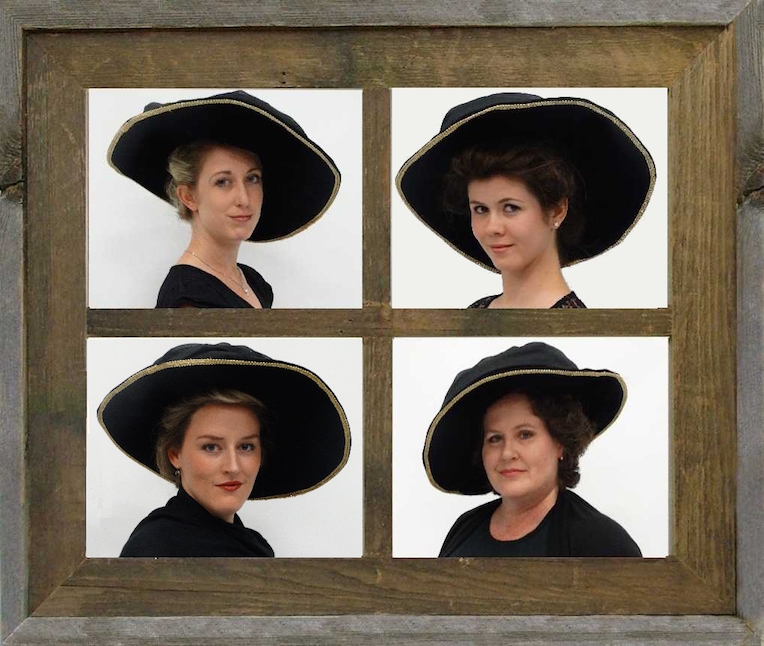
In the Bay Area, opera comes in all sizes and shapes. It is rich and various and always entertaining, making use of the many talented instrumentalists and singers attracted to the area.
One of the most provocative producers is Goat Hall Productions, which started some 16 years ago in Goat Hall Theater in San Francisco’s Potrero Hill district. Dedicated entirely to new chamber-sized works, the company has little of the pull, or the budget, of main stage opera, but its small operas are big on ideas and ambition, and have much to offer in creative energy and imagination. It’s a company that really deserves much more in public interest and support.
Led by Artistic Director Harriet March Page, a talented and dedicated mezzo, and Music Director Mark Alburger, its principal composer, the company’s “Fresh Voices” series pursued the theme of “Memories and Desires” in this year’s performances. The two weekend performances, August 12-13 and 26-27, presented in one of the more intimate theaters of the Lesher Center for the Arts in Walnut Creek.
The opening piece was Rosetta’s Stone, a 40-minute chamber opera written by a team of writers in Norway and California: composers John Bilotta and Jostein Stalheim and librettists Oden Ben-Horin and John McGrew. The opera tells of a music professor’s descent into the confusions of Alzheimer’s. His student, Rosetta, bears witness to his demise.
The premise is delivered through the trope of a café, where waitresses and baristas scurry to and fro, showing the professor and his student to his preferred table, brewing him a cappuccino, and bringing his “usual” lunch. All is in order and moves with predictable grace, except the staff has rather odd names. Like Amygdala, Thalamus, Hippocampus and Brain Stem. The staff is nothing less than the parts of the professor’s brain, working in concert.
At the beginning of the opera the café is in working order. At opera’s end nothing is in working order. The Cortex has forgotten where the professor usually sits, doesn’t even recognize him, the Thalamus delivers multiple sets of the one ordered cup of coffee. It’s chaotic, funny and oddly poignant.
The music that sets the story is written in a similar way, beginning with phrases of Satie, which morph in chaos and complexity, disintegrating in a way. The ensemble is a trio of clarinet, cello and piano. The singers are all sopranos, of one color or another, except for the professor, who is sung by Wayne Wong. His is not a smoothly beautiful voice, but perfect for the role. Rosetta is sung by soprano Cass Panuska, who does have a beautiful voice, which we get to savor during a long meditative aria.
This was a fascinating attempt to portray a condition that, with the graying of the culture, is frequently encountered and that carries lots of misunderstanding and fear along with it. As much as I enjoyed the quick, broad sketches of the present version, I thought the opera would be well served by expansion and a lengthening to more clearly portray the changes the professor suffers.
The second half of the program was Mark Alburger’s Alma Maria Schindler Mahler Gropius Werfel. The topic brings to mind, of course, Tom Lehrer’s song: “Alma, tell us!/ All modern women are jealous/ Which of your many charms/ Got you Gustav and Walter and Franz?” A fascinating and enduring topic: The beautiful and talented woman who captured the hearts of most of the men of the cultural center of Vienna in the early 20th century.
Notably, she had abandoned her own musical composing after marrying Gustav Mahler, who was dismissive of her art, an attitude that led to conflict in the marriage. But Alburger includes five of her songs in the opera itself.
Trying to portray the complex life of Alma Mahler is a tough one, and the composer divides it roughly into four parts, with four different singers assuming Alma’s “hat”, literally and figuratively. In fact all the many characters sung by the nine singers switch hats to indicate switches in roles and identities. It’s a clever bit of staging. The staging would have been helped by supertitles, the quickly moving music and complicated history are almost impossible to follow. The ensemble is enlarged to eight instrumentalists under Alburger’s baton.
Despite its rough edges, Goat Hall Productions’ “Fresh Voices” series is well worth following. It’s opera and theater at its wildest, where the impulse is love, and love alone.
– Jaime Robles
Photo: The four ages of Alma Mahler, (clockwise, from the upper left) Kassidy Grace Mayernik, Larissa Lorenz, Jill Wagoner and Christa Durand. Photo by Tony McWay.
